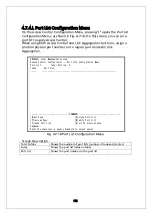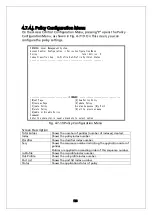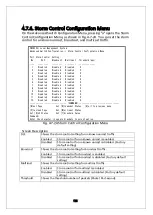
151
Available commands are listed below.
N Show the next page.
Press "N." The screen shows the next page.
P
Show the previous page.
Press "P." The screen shows the previous page.
C Create a policy.
Press "C." The Create Policy Configuration Menu opens. For the Create Policy
Configuration Menu, refer to the next section (4.7.4.k).
D Delete a policy.
Press "D." The command prompt changes to "Enter a policy index>." Enter a policy
index number to be deleted. Then the command prompt changes to "Are you sure
to delete policy index xx (Y/N)>." Press "Y" to delete the policy. Press "N" to cancel
the deletion.
E
Enable/disable the policy status.
Press "E." The command prompt changes to "Select policy index>." Enter a policy
index number to be enabled/disabled. Then, the command prompt changes to
"Enable or Disable Policy Entry>." Press "E" to enable the policy. Press "D" to disable
it.
Enabled
Enable a policy.
Disabled
Disable a policy.
S
Show the policy information.
Press "S " to display detailed information on each policy.
U Modify a policy.
Press "U." The command prompt changes to "Enter policy index>." Enter an index
number to be modified. Then, carry out the same operation as that for creating a
policy. Remember that modification is rejected if the policy is enabled. If enabled,
disable the policy and then modify it.
B Show a sequence number of policy applied to each port.
Press "B." The command prompt changes to "Enter port number>." Enter a port
number to display. Then, the command prompt changes to "Select policy index
order or policy sequence order (I/S)>." Press "I" to confirm a policy sequence
corresponding to the policy index. Press "S" to confirm a policy index sequence
corresponding to the policy sequence.
Q Return to the previous menu.






























